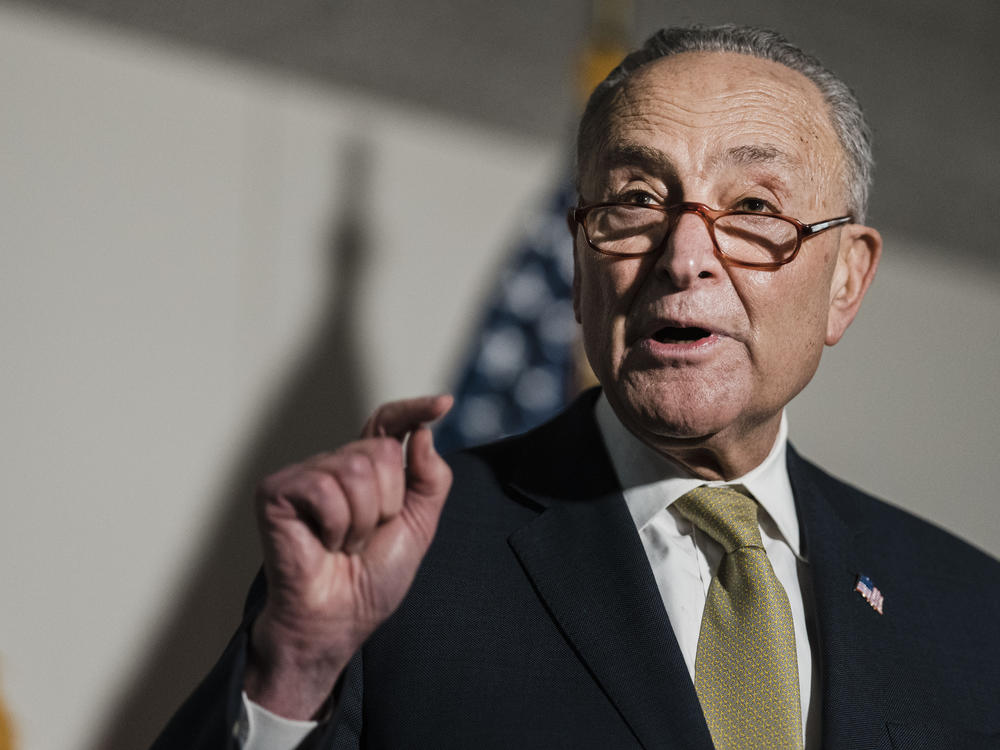Section Branding
Header Content
Schumer insists failed votes on voting rights and filibuster were right thing to do
Primary Content
Updated January 20, 2022 at 6:57 PM ET
Senate Majority Leader Chuck Schumer, D-N.Y., is defending his decision to hold failed votes on voting rights legislation and changing the filibuster as a necessary step in holding Republicans and members of his own party accountable for their votes.
In an interview with NPR, Schumer downplayed the risks of holding such a public demonstration of the rift within his own party ahead of this year's midterm election. Schumer said the failed votes will help Democrats move forward, but he did not offer a specific plan for how to enact the rest of President Biden's agenda.
"Senators are here to vote. They should be put on record," Schumer said in defense of the failed votes. "Those who are opposed to advancing voting rights and who support suppression of voting rights — the public should know who they are."
There has been intense pressure on Schumer and Biden to find a way to negotiate with the two consistent holdouts in their party, Sens. Joe Manchin, D-W.Va., and Kyrsten Sinema, D-Ariz. They tried public meetings, private meetings, trips to the White House and public shaming — all without success.
Schumer said the votes that failed this week in the Senate forced every lawmaker to take sides in front of the country, including activists and members of the party's base.
"Now the public knows where people stand," he said. "I think those who voted against it will feel a lot of heat."
Schumer also defended Biden's negotiating strategy on voting rights in particular.
"He has made it clear how he felt he gave three very powerful speeches," Schumer said. "He spoke individually to Senators Manchin and Sinema. So he's working alongside us because both of us feel that this is a vital issue to the republic."
The blame, he said, lies with two Democrats who ignored the rest of the Democratic Party and viewed Senate rules as "less important than the right to vote."
Despite setbacks, Schumer finds some success in his first year as majority leader
Schumer is marking his own first anniversary as Senate majority leader. In that time, Democrats have passed the nearly $2 trillion American Rescue Plan to address the coronavirus crisis and a separate $1 trillion bipartisan infrastructure bill. But the vast majority of Biden's domestic agenda, including addressing climate change, voting rights and an expansion of the social safety net, continues to languish in the Senate.
Speaking Thursday in his office at the Capitol, Schumer echoed the words Biden used a day before at his own news conference marking his first year in office.
"We've had a successful year," Schumer said. "We haven't had it completely successful, but you keep fighting."
"We're in the week of MLK Day, the inspiration of Dr. King who never gave up, who didn't let setbacks set him back and who didn't shy from tough fights, even though the outcome was not clear at the beginning," he said. "That's our inspiration."
Democrats are preparing for what could be a brutal election in November. Historically, it is common for the party of the president to lose seats in a midterm election. Plus, Democrats have to contend with newly drawn congressional lines that could reduce their numbers on their own.
But Democrats have also failed to follow through on some of the most basic promises to voters, like passing new voting rights protections.
Schumer focused instead on what Democrats did achieve.
"The [American Rescue Plan] bill is one of the most progressive and important pieces of legislation in decades. We've put more judges in, these are life time appointments," he said. "We put more judges in office in the first year of a president's term or a majority leader's term than anyone since ... 40 or 50 years."
He said those achievements — paired with the work Democrats were able to complete with the help of Republicans — make for a significant record.
"We got a big bipartisan bill done, the bipartisan infrastructure bill done, and many other things as well," Schumer said. "Are we going to continue to fight on voting rights? Yes."
Copyright 2022 NPR. To see more, visit https://www.npr.org.

